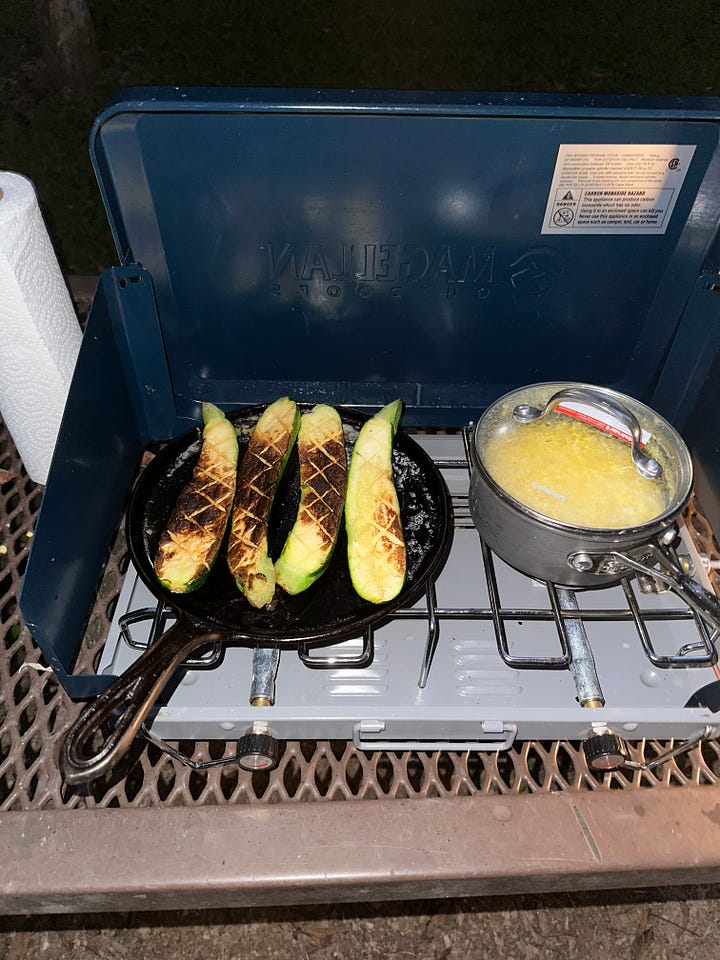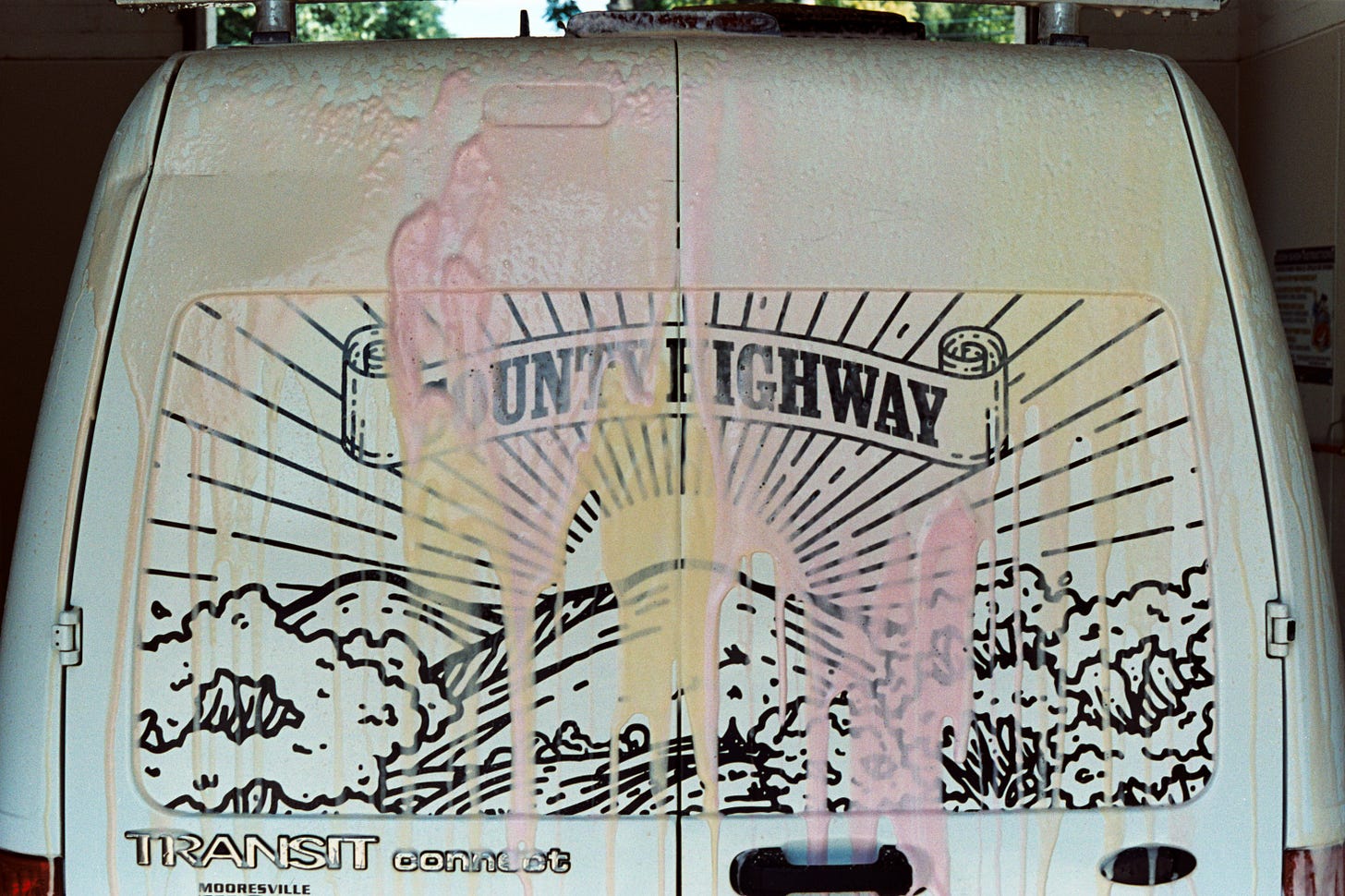Should’ve stayed in Marion.
I’d had that same faint knocking on the gut that made me turn around and go back to Old Shawneetown but ignored it in favor of finding something in an interesting name. Marion had the more beautiful downtown.
The home of Southern Illinois University, an obviously commercial venture—like most of the country’s higher-ed institutions—and one among the innumerable, so-called ‘party schools’, Carbondale is a college town. And like most college towns, certainly that of my own Alma mater, it possesses neither the former quaintness nor character. What was an earnest attempt at a grid city plan had long been well-carved up in service to the ever-expanding campus loop.
The temperature was already climbing out of the low 80s—set to be 101 across the region tomorrow. Perspiring and in mild distress, I chose to open my bank account app. Pleasantly surprising was the unsuspected additional thousand dollars padding the 340 lingering in my checking account; I doubted it was more than a temporary accounting error.
Continuing the theme, I texted Nathan, the previous owner of my van, threatening to take him to court over the broken A/C he’d concealed; “it was too much to let slide” what with the solar panel and dash screen both now kaput.
In the parking lot and called PayPal Credit’s Synchrony Bank for what must be the twentieth time since November, when I purchased a winter coat I never received. “I can’t afford to pay $882.75 that I don’t actually owe you,” I said to yet another account manager.
The cafe was closed. So was every other one in Carbondale—college town, summer time. There was no reason to explore further, so I put Silver Mine, Missouri in my phone and started following its thin blue line and came to Murphysboro. The welcome sign read “Find it in Murphysboro.” The it was an open cafe with air conditioning and a chocolate donut and nice woman working who assumed that my AC problem was, like hers, due to driving ‘an old car.’ I didn’t correct her.
Driving into Murphysboro, I’d seen a self-service carwash, and after my coffee and some writing, I went over. I tried to use the automatic, and paid the $12, but felt the back part of my roof rack thunk against the chained-up PVC clearance guide and backed out. There was no one to speak to about the $12, and I still wanted the van clean, so I used the self-service, which I found to be more satisfactory—it would have also been half the price, minus the $1 for the vacuum.
I broke into a more vigorous sweat scrubbing and spraying the car. When I had covered the van in the tri-color shampoo, I wanted the yellow and orange and hot pink suds ooze down the back panels, over the County Highway logo, and wondered what I had done, what I’ll now do to make things even better, to make up for how hard they’ve suddenly become.
Joyous at times, and altogether bearable, but hard nonetheless. It may take a long time to slow down, and there may be consolation in what Moon writes about nothing feeling better than the beginning of feeling better, but it takes no time at all to start feeling bad again. And driving through flat Illinois in 98 degree heat is one way to get there. You feel as if you’ll never be clean and dry again, and then you get used to it. But at least the van is now what I am not, pure white and sparkling with good care.
My second $3 round cut off just as I was getting to the last panel, so I pulled it into the bank parking lot across the street to photograph the side of building that was once concealed by another, long gone, and drove on.
More flat corn stretching just above the driving eye, more barns, a few of them photos. I stopped at a Marathon to gas up. Parked at the pump between the store entrance and my van was an old, beaten and rusting truck; a young girl, maybe sixteen, sat in the passenger seat. She had a sore look about her and dark bruise circling her left eye. I wondered who’d done it to her, and when I walked in I looked for hints in the other customers.
I bought a Redbull, a Payday, and a bag of ice, and then I saw the man. Wirey, shorter than myself, with a long grey-blond ponytail. When I came out, he was surveying the truck’s engine, the girl was standing by the passenger door, facing inward. I had hoped to catch her eye, to ask with my own, if possible, whether she was alright. I went back in to buy some chicken fingers—the woman said they were “fresh,” adding that this meant they were only hot, not delicious. When I walked out, the man and the black-eyed girl were gone.
The highway was four-lanes for a while and seemed to pass strictly through unincorporated towns with unmemorable names. I took more photos before crossing over the Saint Francis River. On the left, there was a pig farm, giant porkers wading in mud to keep cool. Off on the right and on the Eastern edge of Mark Twain National Forest was the campsite.
Self-service by cash or check demanded by the entrance signage, I drove past the campground host, napping in a fold-out chair in front of a camper trailer, and went back to Fredericktown—a town made of gas stations and things that look like gas stations—to find an atm.
Finding one, I withdrew forty dollars and pulled a single sixteen ounce Coors Banquet from a six-pack. A meth-head type was busy buying her lotto ticket. “Do I look old enough to buy those,” she joked about her two single-shot bottles of moonshine. The cashier got confused with the price of my single beer, and a line formed; when she apologized, one man consoled “I ain’t got no curfew,” and a woman added “at least I’m not outside.” Big heat makes tolerable places out of generally intolerable ones.
Back at the campsite, Wayne had woken. “How long y’staying,” he greeted. I told him just a night. “That’ll be fine. We got some reservations coming in, but not ‘til after tomorrow.”
We talked about the heat—everywhere the elephant in the room. “You picked a bad time to come this way,” he said, squirreling his good eye up at me, “now we got this Hades heat.” I mentioned the van’s broken A/C, he mentioned the unseasonal flooding: “Twice up over the bridge already.” I asked his name, told him mine, he said to call if I needed anything, and I went down to the river, hoping to cool off.
In August, Southern Missouri is filled with boulders too hot to stand on, at least for long barefoot. The Saint Francis, filled with such stones, all smoothed over with dry mud made instantly slick by wet feet, was wide and clear, green and golden brown.
There were slipstreams to slide into, stone ramps to rush down, and swift currents to float or swim against. Clambering up new vantages, I dyed my yellow shorts with mud until, feeling no cooler than before, I went back to set up camp.
The flies soon found me out. A dozen had already made their home in the van, one or two at work on the bristles of my toothbrush. More clung to my flesh as sweat welled up through my pores, beading like a million wellsprings. There were horseflies, too.
I called Susanna and we talked as I prepped the corn I’d bought earlier at a roadside market along with a tomato and a fresh-squeezed lemonade. I did 50 push-ups and changed out of my clothes into a pair of running shorts I didn’t mine sweating through.
As the corn stewed in butter on the stove and the zucchini, cut, scored and salted, did its own ample sweating, I wrote. The temperature is still well-above 85 degrees, and I’m hoping that by the time I’ve finished eating too hot a meal, the air will have cooled down enough to try another bath of chilled bottled water. Without a signal, it’s a good night to read.









